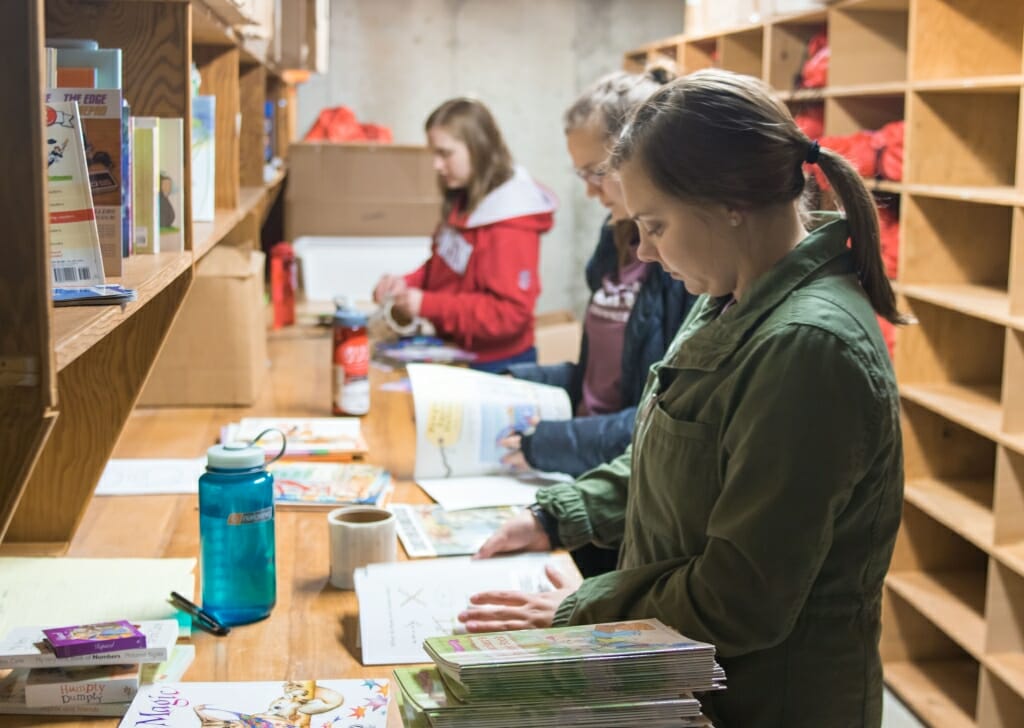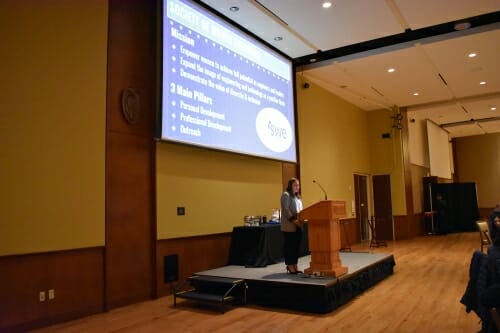UW-Madison students score highly on leadership; study shows campus activities with highest impact

As a UW student, Emily Vesper joined Badger volunteers. She worked for a non-profit organization called REACH-A-Child, where her team sorted through book donations to determine which books were appropriate for the program. The team won the Badger Volunteer Team Award in May 2018.
During her four years at UW–Madison, Emily Vesper was an active member of the Society of Women Engineers, a Badger Volunteer, and worked to distribute healthy, locally sourced food through Slow Food UW.
She attended conferences around the country and traveled to Jodhpur, India; she worked with first- and second-grade students; and she managed the balance sheets of a nonprofit organization. She even served as president of UW–Madison’s SWE chapter her senior year.
“I think the University, as a whole, does a great job of emphasizing the importance of becoming involved on campus and using your individual strengths to make a difference,” Vesper said.

Vesper addresses a Society of Women Engineers conference. She served a number of offices, including section president in 2019-20. Submitted photo
A new study shows strong leadership outcomes for UW–Madison students, especially those who do community service or participate in student organizations as Vesper did.
UW-Madison students scored as high or higher than students at other institutions, with few differences among UW–Madison schools and colleges or demographic groups, in the Multi-Institutional Study of Leadership (MSL).
It’s part of an effort by campus leaders to assess which student experiences are associated with leadership development and to understand whether students have equitable access to those experiences. Principal investigators for the study were Mark Kueppers, assistant dean and director of the Center for Leadership & Involvement, and Greg Harrington, professor of civil and environmental engineering and the Pieper Family Foundation Chair for Servant Leadership.
“Effective leadership education prepares UW–Madison students for their careers and for addressing complex social challenges on campus, in our communities, and around the world,“ Kueppers said. “We’re proud that our students are developing these leadership skills through many opportunities on campus, in and out of the classroom. Their skills and passion are being applied at this moment to make the world a better place.”
The MSL survey, completed by 3,242 UW–Madison students in early 2018, evaluated multiple leadership outcomes, such as leadership capacity, complex cognitive skills and a sense of belonging. Students also took the survey in 2009 and 2015 at UW–Madison, and will take it again in 2021.
“We want to ensure students make the most of campus opportunities to gain leadership skills and make a difference,” said Mark Guthier, associate vice chancellor for Student Affairs and Wisconsin Union director. “Just as we ask students to never stop asking questions, we must, too, ask ourselves important questions as higher education professionals, including how we can continue to eliminate barriers to leadership development.”
Certain campus experiences were found to be associated with leadership attainment – socio-cultural discussions outside of class, community service, advocacy, service and student governance group participation, and mentoring.
No significant differences in leadership experiences and outcomes were seen in terms of race, gender, socio-economic status or school/college affiliation, the study notes.
“We’re pleased that high leadership attainment was widespread throughout different demographic groups and schools and colleges,” Kueppers said. “To ensure leadership development is even more widespread, the report recommends evaluating barriers to participation and outcome attainment.”
The report notes that UW–Madison students are encouraged to engage in their own Wisconsin Experience .” “This experience is intended to develop intellectual and personal growth in areas of empathy and humility, relentless curiosity, intellectual confidence, and purposeful action,” the report says. “These areas of developmental focus set UW– Madison students apart from their peers at other institutions, while also preparing them for life and career after graduation.”
As for the future, the report recommends developing education programs which incorporate experiences that help develop leadership capacity – socio-cultural discussions outside of class, community service, advocacy, service and student governance group participation, and mentoring. It also recommends engaging in ongoing leadership research and assessment to understand what works – and what does not.
It also recommends engaging in ongoing leadership research and assessment.
“We think continued improvement of leadership education will further enhance our standing relative to other institutions,” said Harrington, “and we look forward to engaging with the campus community in the development of these programs.”
For her part, Vesper recommends that incoming freshmen who wish to develop leadership skills attend the Student Org Fair and sign up for a few groups.
“It’s going to be awkward at first, especially if you don’t know anyone (which you probably won’t). But, as you continue to go to events, you will meet people and make friends,” Vesper said. “The more active you are in the organization, the more people you will meet, and the more likely you will be qualified to step into leadership positions and create positive change.”
To learn more about the 2018 MSL survey, results, and recommendations to enhance student leadership development at UW, join a talented panel of colleagues for a webinar on Wednesday, August 12 from 1:30-2:45 pm. Webinar details and registration information can be found here.
Tags: Division of Student Life, students




